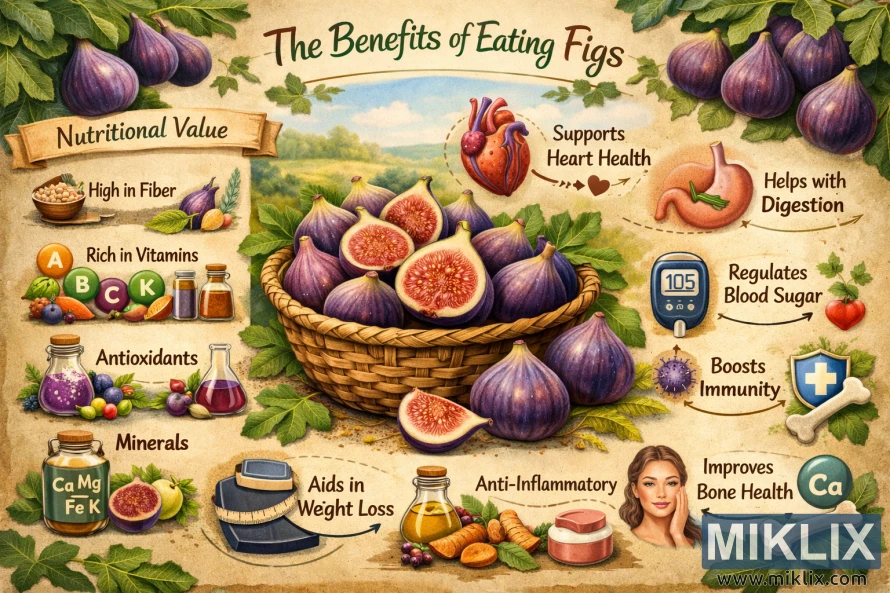From Fiber to Antioxidants: What Makes Figs a Superfruit
Published: May 16, 2025 at 12:18:17 PM UTC
Last updated: December 24, 2025 at 2:39:08 PM UTC
Figs are a hidden gem in the fruit world. They are packed with nutrients, making them great for any diet. They not only taste delicious but also offer many health benefits. Figs are good for your digestive health, heart health, and blood sugar control. This article will explore the nutritional profile and history of figs. It will also highlight their many benefits for your overall health. By learning about these benefits, you'll see why figs should be a key part of your meals.

Key Takeaways
- Figs are rich in essential nutrients.
- They promote digestive health effectively.
- Figs support heart health through their unique compounds.
- They aid in blood sugar regulation for better metabolic health.
- Incorporating figs into your diet is easy and beneficial.
Introduction to Figs
What are figs? Figs, also known as Ficus carica, are small, teardrop-shaped fruits. They come in colors like green, purple, and black. Known for their sweet taste and crunchy seeds, figs are a treat and a nutritional powerhouse.
People have loved figs for centuries. They add flavor to many dishes and are packed with vitamins and minerals. You can enjoy them fresh, dried, or in jams. Adding figs to your diet can boost your health.
Historical Significance of Figs
Figs have always been more than just food. They symbolize prosperity and health. In ancient times, they were highly valued in many cultures.
In Greece, figs were linked to Demeter, the goddess of agriculture. She stood for fertility and abundance. This shows how figs were key to feeding communities.
In Rome, figs were a sweet treat and an honor to Bacchus, the god of wine. This shows figs' role in spiritual rituals. They connected people to the divine.
Before sugar, figs were a natural sweetener. They're used in many Mediterranean and Middle Eastern dishes. This shows their versatility in cooking.
Today, figs are just as important. They remind us of their rich history. Their use has changed, but their value remains.
Nutritional Profile of Figs
Figs are packed with nutrients, making them great for any diet. A medium fig has about 37 calories and 1.45 grams of fiber. This helps meet daily nutritional needs. Their low calorie and high fiber content makes them a healthy choice.
Figs are also rich in vitamins and minerals like Vitamin A, Vitamin C, calcium, iron, and potassium. These nutrients are key for good health. Antioxidants in figs boost their health benefits, helping cells and reducing stress.
Adding figs to meals can be very beneficial. They're sweet and perfect for snacking, salads, or with cheese. Figs are not just tasty but also a nutrient-rich food that supports a healthy lifestyle.

Digestive Health Benefits of Figs
Figs are full of health benefits, mainly for your digestive system. They are high in fiber, which helps keep your bowels regular and prevents constipation. This fiber makes digestion smoother, making figs great for improving gut health.
Figs also have prebiotics, which help the good bacteria in your gut. These bacteria are key to a healthy digestive system. Research shows that figs can even help with irritable bowel syndrome (IBS), giving natural relief.
In short, adding figs to your diet can greatly benefit your digestive health. You can enjoy them fresh, dried, or in various recipes. They are tasty and packed with fiber and prebiotics, essential for a healthy gut.
Figs and Heart Health
Figs are great for your heart. They are full of potassium, which helps control blood pressure. This is key for a healthy heart. Eating figs daily can help manage blood pressure.
Figs also have a lot of fiber. This fiber helps lower bad cholesterol, or LDL. Lowering LDL is important for a healthy heart. Some studies even suggest fig leaf extracts might help more, but more research is needed.
Bone Health and Figs
Figs are great for your bones, thanks to their calcium and potassium. Adding them to your meals can boost bone density. This makes your bones stronger and more resilient.
Calcium is key for strong bones. Potassium in figs helps keep bones from breaking down too fast. Studies show that potassium helps keep bone mass high, reducing osteoporosis risk as you get older. Eating figs is a tasty way to support your bones.
Adding figs to your diet is a smart move for bone health and overall wellness.
Figs for Blood Sugar Regulation
Figs may help control blood sugar levels, which is great for people watching their glucose. They have a low glycemic index, which is good for avoiding blood sugar spikes. Early studies on fig extracts show they might improve how well the body handles glucose and insulin.
While fresh figs are good, dried figs have more sugar. It's key to eat them in small amounts to keep blood sugar balanced. Adding figs to your diet could be a tasty way to help manage blood sugar and improve health.
Figs and Skin Health
Figs are great for your skin, packed with vitamins and antioxidants. They help fight dryness and keep your skin looking healthy. The natural compounds in figs can even soothe skin problems like dermatitis and eczema.
Using fig extracts can improve your skin in many ways. Fig leaf tea is also a great natural remedy. It has anti-inflammatory properties that can help your skin feel better.
Adding figs to your beauty routine is a smart move. You can eat them or drink fig leaf tea. Both ways, figs can help keep your skin healthy and glowing.
Antioxidant Properties of Figs
Figs are packed with nutrients, including antioxidants that are good for your health. They contain carotenoids and polyphenols. These compounds fight oxidative stress in the body.
By reducing free radicals, figs may lower the risk of chronic diseases. This is one of the many health benefits of figs.
Figs also have anti-inflammatory properties. This makes them a great addition to a healthy diet. Eating figs regularly can help reduce inflammation and support cell health.

Adding figs to your meals is a tasty way to increase your antioxidant intake. You can enjoy them fresh, dried, or in various recipes. They add a sweet flavor and provide important nutrients, making them a favorite among health enthusiasts.
Weight Management with Figs
Figs are great for managing weight. They have few calories but are sweet, making them perfect for those watching their weight. This balance is key for effective weight management.
Figs are full of fiber, which helps you feel full. This can reduce hunger and support weight loss. Snacking on figs can also stop you from eating too much at meals.
- Low in calories yet high in taste.
- Fiber-rich content promotes satiety.
- Satisfies sweet cravings without excessive calorie intake.
Using figs for weight loss is both fun and healthy. They add nutrients to your meals, improving taste and health.
Potential Cancer-Fighting Properties of Figs
Figs are not just good for you; they might also help fight cancer. Studies on fig leaves show they could be effective against colon, breast, cervical, and lung cancers. This is because of the special compounds they contain.
These compounds, like antioxidants and phytochemicals, help fight free radicals. Free radicals can cause cancer. So, figs might help prevent cancer by reducing oxidative stress.
Even though figs seem promising, we need more research. We need to see how they work in people, not just in lab tests. This could lead to new ways to prevent and treat cancer.
How to Incorporate Figs into Your Diet
Figs are a tasty and versatile fruit that can make many meals better. If you're looking for recipes using figs, you'll find lots of options. Enjoy fresh figs as a healthy snack or add them to salads for a sweet touch. They also go great with cheese, making them perfect for cheese platters.
Baking with figs can lead to creative dishes. Try using dried figs in cookies or cakes for a special flavor. Making homemade jams with figs can make breakfast or snacks even more enjoyable.

When eating figs, remember they are sweet because of their sugar content. So, it's important to eat them in moderation. Here are some tips to make figs a regular part of your diet:
- Add fresh figs to smoothies for extra fiber and vitamins.
- Top oatmeal or yogurt with sliced figs for a healthy breakfast.
- Roast stuffed figs with nuts for a tasty side dish.
- Try different cuisines that use figs in unique ways, like Mediterranean dishes.
With these ideas, you can easily add figs to your meals every day. This way, you can enjoy their health benefits too.
Possible Downsides of Eating Figs
Figs are a tasty fruit with many health benefits. But, it's important to know the downsides. Eating too many figs can cause stomach problems like diarrhea. This is because figs have a lot of fiber, which can be uncomfortable if you eat too much.
Some people might get upset stomachs or feel bloated from figs. This is more likely if you're not used to eating foods high in fiber. If you have a sensitive stomach, be careful.
Also, fig allergies can be a big problem for some. If you're allergic to birch pollen or latex, you might also react to figs. Symptoms can include itching, swelling, and stomach pain. If you have allergies, it's best to talk to a doctor before eating figs.
Where to Find Quality Figs
Finding quality figs can make your snacks and cooking better. Look for different places to buy figs. Each spot might have its own special selection.
- Grocery Stores: Many supermarkets have a fresh produce section with seasonal figs. Look for fresh figs during late summer to early fall, when they're at their best.
- Farmers' Markets: Local farmers' markets are great for finding fresh, locally-grown figs. Buying directly from farmers means you get quality fruit and support local farmers.
- Specialty Food Shops: Gourmet stores often have both fresh and dried figs. They usually have a bigger variety of dried figs, so you can find them all year.
When you're shopping, pick figs that are firm and have smooth skin. Avoid any with blemishes or signs of being too ripe. These tips will help you find the best figs for your recipes.
Conclusion
Figs are packed with health benefits, making them great for any diet. They help with digestion and heart health. They also might help fight cancer, which is a big plus for your overall health.
Adding figs to your meals can be fun and healthy. You can eat them fresh, dried, or in tasty dishes. Their flexibility lets you get creative in the kitchen, enjoying their taste and health perks.
Adding figs to your daily meals can be a tasty way to boost your health. Try them out and see how they can improve your well-being. A small change like adding figs to your diet can make a big difference.

Further Reading
If you enjoyed this post, you may also like these suggestions:
- Avocados Uncovered: Fatty, Fabulous, and Full of Benefits
- BCAA Breakdown: The Essential Supplement for Muscle Recovery and Performance
- CLA Supplements: Unlocking the Fat-Burning Power of Healthy Fats
